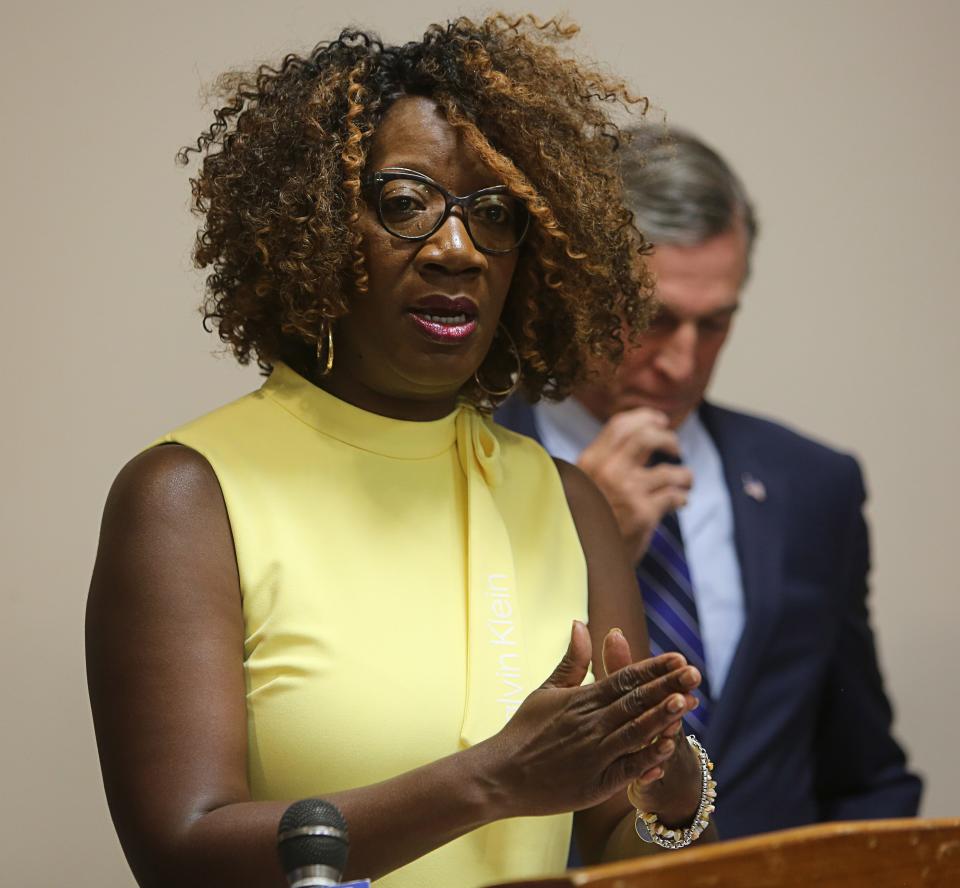Lawmakers aim four-bill package at reform in Delaware's long-term care facilities
Lawmakers hope Delaware can straighten up its long-term care industry.
Sen. Spiros Mantzavinos and Rep. Kendra Johnson led that charge Monday, unveiling a legislative package with aims to ensure families can trust "long-term care facilities in the First State are operating at the highest standards to meet the needs of Delaware’s aging population."
The four-bill, bipartisan package introduced Monday stands to provide some of the strongest statewide reforms this industry has seen in decades, the Democratic lawmakers said in a press conference ahead of the filing.
At a glance:
House Bill 300 — This would require assisted-living facilities unregulated by the federal Centers for Medicare & Medicaid Services to maintain accreditation from an independent organization selected by the Delaware Department of Health and Social Services, according to lawmakers.
The legislation also would define dementia care service in Delaware Code for the first time, and require facilities that provide those services to meet independent certification standards.
The Joint Commission, a nonprofit that accredits health-care organizations across the country, was mentioned as a possible example.
Senate Bill 215 — This bill would change how often the Division of Health Care Quality is required to conduct in-person inspections of assisted-living facilities and nursing homes. While state law requires “regular” inspections, Mantzavinos called that language far too vague. So, SB 215 would make clear that in-person inspections of the roughly 80 facilities in operation must occur at least once a year.
Failure to maintain accreditation required for a facility or the certification required for a dementia service could lead to civil penalties and a potential suspension or denial of a license to operate.
Senate Bill 216 — This next piece looks to increase civil penalties that can be imposed against long-term care facilities. Those fines have not been adjusted since 2000. Under this recalibration, all fines would be doubled to account for inflation over the last 24 years.
In the case of penalties deemed to pose a threat to the health and safety of a resident, fines would go from $1,000 at minimum, to $2,000, with a $20,000 maximum. The maximum for violations not constituting a serious threat would move from $5,000 to $10,000. Each day of a continuing violation constitutes a separate violation, and these violations are further defined in the legislation.
Senate Bill 217 — This bill aims to bolster the long-term care workforce by strengthening the pipeline of health-care workers graduating from Delaware universities. The legislation would create a career-based scholarship program that incentivizes nursing students and others to pursue careers in Delaware’s facilities in exchange for financial aid. Lawmakers hope to see $1 million in funding to fuel this program.
"I remain committed to advancing all of the bills we have put forward so far, as well as developing new bills that will help ensure our older neighbors are able to enjoy their senior years in safety and comfort," Sen. Mantzavinos said.
The package follows three years of research, the senator said, culminating work that gained momentum after the COVID-19 pandemic laid bare vulnerabilities in these facilities.

It also comes after a 2023 Delaware Online/The News Journal investigation found the state has failed to policed its long-term care industry over the past decade. Delaware families spoke of trusting facilities with their loved ones, only to watch them suffer harm and often die within these buildings. Investigation also showed even when high numbers of abuse, neglect and falls were reported to the Division of Health Care Quality, an inspections backlog grew.
Later, a congressional investigation into the issues nationwide also confirmed that reporting, finding that many states have has this backlog of nursing home inspections because of a lack of federal funding and needed inspectors. Today, the state has almost cleared the backlog in its overdue inspections, as reported by Delaware Online, getting closer to a goal of surveying nursing homes and assisted-living facilities on an annual basis. The Delaware General Assembly also approved increased Medicaid reimbursement rates for long-term care facilities.
"Look, there's gonna be a price tag associated with this, and... this is just too important to not look to address right now," Mantzavinos said. "I think the backlog is something that is on the minds of pretty much all legislators throughout the state now."
Monday's announcement came with a goal of not allowing Delaware to repeat recent history.
The investigation: She was a geriatric nurse. Why did it take Delaware so long to realize she was neglected?
Where does Delaware care go from here?

One of every four Delawareans could be 65 or older by 2050, Mantzavinos told the press conference.
Those population projections include those born here, alongside the many moving in for retirement. Either way, he said, "We have to understand that long-term care facilities play a vital role in ensuring that all Delawareans, whether they're new to the state or have lived here their entire lives, are able to age with dignity."
The package also received support from the Delaware Elder Care Advocacy Coalition, a group of families who united in late 2023 to push for more transparency, accountability and care for Delaware seniors. It builds on the work of other legislative groups, like the Long-Term Care and Memory Care Task Force.
“Transparency and accountability to follow current regulations is critical to resident safety, identifying systemic issues and empowering families in decision making for choice of facilities," Coalition Founder Candace Esham said in a statement. "Enabling a workforce to dedicate their service to our most vulnerable population will help current staff and residents, as well as better prepare Delaware for the future.”
These four bills also join 2023 legislation aimed at the same sector.
Catching up: How Delaware is clearing its backlog in surveying long-term care facilities
Last year a resolution directed DHSS to submit a report this spring detailing recommendations for how best to implement a person-centered acuity model of long-term care staffing. Gov. John Carney signed into law Senate Bill 152, setting cultural competency and language accessibility standards for facilities.
Senate Bill 150 — strengthening staffing training requirements for long-term care facilities that offer dementia care — and Senate Bill 151 — looking to ensure long-term care facilities are giving an honest account of the dementia care services they offer — are both awaiting votes in the Senate, per Monday's presser.
All speakers called this just a "foundation" for addressing concerns in Delaware's industry.
"I've spent my entire career serving vulnerable populations," Rep. Johnson said. "And I've seen firsthand how transformative safe, adequate and dignified care can be to an individual's quality of life. We must ensure that those who live in these facilities, and particularly those living with dementia, have access to reliable high-quality care they need and deserve."

Fall 2023: Why no one seems to agree on how to improve dementia care inside Delaware long-term care
Deeper: They trusted this assisted living to protect their mother. Then came the call on Christmas
Looking back
Delaware Online/The News Journal's investigation found:
The Division of Health Care Quality, as of March 2023, had nearly 1,500 complaints for nursing homes and assisted-living facilities in its backlog. Since 2013, assisted-living complaints overall had been investigated less than nursing homes.
From 2013 to 2021, an average of about 22% of the assisted-living complaints filed were investigated by the state each year. Nursing home complaints, in comparison, had an average investigation rate of about 49% in that time period.
The state has chronically struggled with hiring and retaining staff to investigate these facilities, in part because of low salaries. The division has asked for additional funding in recent years but has been repeatedly denied by the governor’s office.
Delaware stories that made a difference: Read some of our most impactful work from 2023
Got a story? Contact Kelly Powers at kepowers@gannett.com or (231) 622-2191, and follow her on Twitter @kpowers01.
This article originally appeared on Delaware News Journal: Lawmakers look to usher reform in Delaware's long-term care industry

